Kosher and Traditional Jewish Cooking: Authentic Recipes From a Classic Culinary Heritage: 130 Delicious Dishes Shown in 220 Stunning Photographs (45 page)
Authors: Marlena Spieler
To make farfel (pellets), grate kneaded, unrolled noodle dough through the large holes of a grater to form pellets. Boil and add to soups.
In times of plenty, pancakes were made from the best ingredients; when times were hard they were made from whatever wild greens could be found.
Crêpe-like blintzes are filled with cheese, meat, fruit or vegetables and often folded into parcels and fried until crisp. Thick, hearty latkes are a treat often eaten at Chanukkah, consisting of grated potatoes formed into cakes and fried.
Chremslach are thick pancakes eaten at Pesach. They are made from egg, matzo meal and seasonings and served with sour cream or yogurt.
Ataif are Egyptian pancakes, raised with yeast and served with a sweet syrup and clotted cream.
The word knaidlach comes from
knodel
, the German for dumpling. Knaidlach are as much a part of Yiddish cooking as dumplings are of Eastern European peasant food. Because they were made with matzo, knaidlach were eaten for Shabbat and other festivals, especially Pesach, when bread is forbidden.
Sephardi dumplings are made from noodles stuffed with meat, then floated in soup. Alternatively, they may be made from rice.
Whenever there was something special to celebrate, the women of both Ashkenazi and Sephardi communities would gather and spend many days preparing different kinds of pastries.
Classic Ashkenazi pastries include knishes (half-moon shaped turnovers), strudels (wafer-thin pastry rolled around fillings) and piroshkis (small pies). They may be filled with kasha, mashed potatoes and onions, minced (ground) meat, browned cabbage, chopped egg and sometimes smoked salmon. They are baked or fried.
The Sephardim have a virtually endless number of savoury pastries, made with many different types of pastry – from delicate fried filo pastry to crisp, crumbly shortcrust – and filling. They are made in an array of shapes, including half moons, squares, triangles, rectangles, circles and even cones and round balls, and they may be baked or deep-fried in oil.
Sweet noodle kugels may be sold cut into big squares and sold as dessert. Potato latkes can be bought all year round, but are popular at Chanukkah. Blintzes are often sold in delis – hot, blintzes will often be on the menu for brunch, while take-away blintzes can be reheated at home. Many delis sell hot or cold knishes or piroshkis, filled with anything from kasha to meat to spinach. Filo pastries can also be found – spinach and cheese is a particularly popular filling.
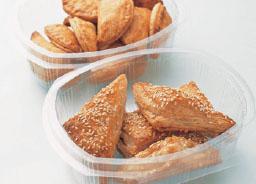
Piroshkis and knishes from the Ashkenazi tradition are particular favourites on the deli counter.
The world over, bread is very important to the Jews. A meal without bread is not a meal, according to the dictates of the Jewish religion. Without bread, there can be no
hamotzi
(blessing over the bread that signals the start of a meal) and neither can there be the Birkat Hamazon (grace, which usually concludes a meal). A meal without bread can only really be considered a snack.
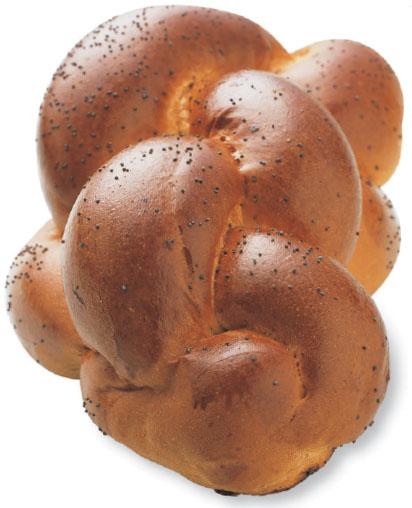
Challah is the traditional bread of Shabbat and festivals and may be braided, round or shaped like a ladder, depending on the festival.
In Jewish bakeries, it is usual for the breads to be
pareve –
made without butter or milk so that they can be eaten with either meat or dairy foods. There is challah, rye bread, pumpernickel, bagels, Kaiser rolls and onion rolls – the variety is astonishing and, if you happen to have wandered into an ethnic Jewish bakery, you may well encounter some wonderful regional specialities as well as the usual fare.
All ethnic groups have a wide variety of breads, both for everyday use and special occasions. When the Ukrainian Ashkenazim emigrated to America, they brought with them sourdough loaves of seeded rye, dark pumpernickel and onion-crusted rolls. Walking into one of their bakeries is a joy: the smells of baking – yeast, flour, a whiff of something sweet – mingling with the scent of the wood-burning stove.
Bagels are an Ashkenazi classic that travelled from the shtetlach and ghettos of Eastern Europe and are now enjoyed all over the world. They lend themselves to any number of different fillings and are very satisfyingly chewy.
Bagels are usually made in bakeries that bake nothing else, because the procedure for making them is a special one. The dough rings are first briefly poached in huge vats of water before being glazed and baked. This technique creates the distinctive dense, chewy texture that has made bagels so popular. To walk past a bagel bakery without venturing in is just about impossible. The alluring smell inevitably entices you in, and you’ll want to get yourself a nice hot bagel before setting off once more.
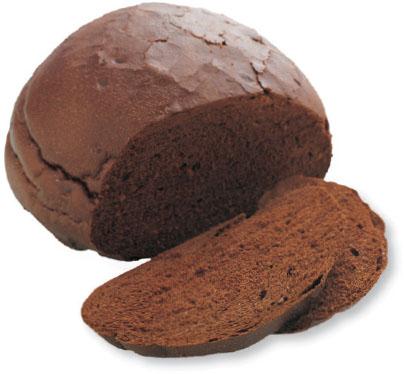
Pumpernickel, from the Ashkenazi tradition, is dark and sour with a crisp crust.
Sweet challah is the traditional Shabbat and festival bread of the Ashkenazi Jews. The dough is made with eggs and vegetable oil, which gives it a soft texture, similar to that of brioche, and is lightly sweetened with honey or sugar.
The loaves are usually braided, made with three, six or even twelve strands of dough. During Rosh Hashanah challah may be shaped into a round or crown, in honour
of the Rosh Hashanah blessing: “The whole world will crown thee.” On the eve of Yom Kippur, the challah is shaped like a ladder, raised arms or wings, representing prayers rising heavenwards.
Boulkas are small, individual challah rolls, shaped into rounds, braids or spirals and dusted with poppy seeds, that are frequently served at weddings.
These vary greatly and are very different from the breads of the Ashkenazim. Some are risen; some are flat; some, such as melawah, are slightly puffed and fried to a crisp. One Sephardi bread most of us are familiar with is pitta, a flat bread favoured by Jews and Arabs alike, and by many other Middle Easterners as well. Iraqi pitta bread is a large flat bread, which resembles an enormous, thick pancake.
Breads that are especially made for the Sabbath include mouna, lahuhua and kubaneh. A coiled bread from Yemen, kubaneh is made from a rich yeast dough. It is prepared before the Sabbath begins, then steamed in a very low oven overnight.
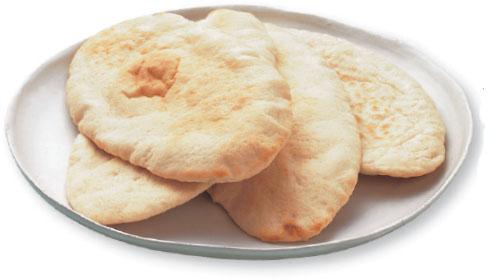
Pitta bread came from the Middle East but is now enjoyed by Ashkenazim, Europeans and Americans alike.
Israel produces a marvellous array of breads, from the simple everyday loaf, which is crusty on the outside and beautifully tender inside, to large flat breads, which are used for wrapping around vegetables or meat.
These are unleavened breads, made especially for Pesach, when leavened bread may not be eaten. The flat, brittle matzo sheets are served at the table, and are also ground to make a meal that is transformed into cakes, biscuits and cookies. Matzo meal can be either fine or coarse, while matzo farfel is lightly crushed matzo.
For Pesach, matzos are prepared under special guidelines and the packaging must always be marked “Kosher for Pesach”. Observant Jews often eat schmurah matzo, which is always handmade to an extremely high specification.

Jews eat unleavened matzos at Pesach but they are also enjoyed during the rest of the year.
Oy what sandwiches! A true Jewish deli sandwich is a thing of mammoth proportions. Piles of salami, billows of roasted turkey, peppery pastrami, corned or salt beef, bologna or steamed knockwurst are just some of the possible ingredients, and most likely there will be a combination of several of them, at least 350g/12oz per sandwich, layered between thick slices of fresh, crusty, tender bread. A sandwich from one of the legendary New York delis, such as the Carnegie or Second Avenue Deli, Katz’s, the Stage Deli or Juniors will be far too thick for the average eater.
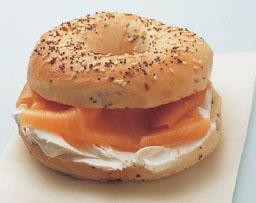
A bagel filled with cream cheese and wafer-thin slices of smoked salmon is the quintessential Jewish deli snack.